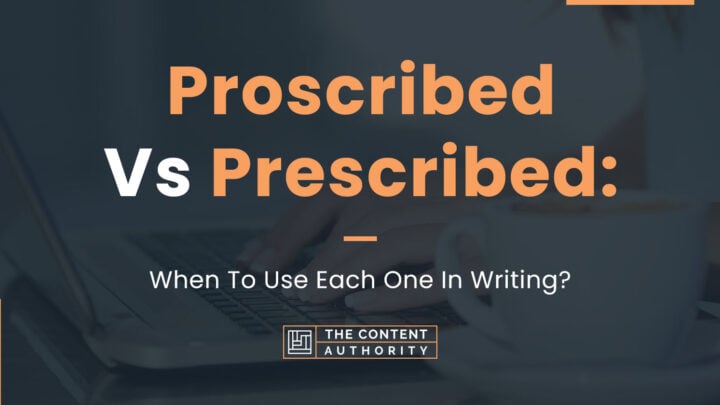When writing, it is necessary to ensure your spellings are right because a single letter can change a word and imply something different than intended. It is also essential to know the meaning of a word before using it so that you do not confuse your readers. In this article, we will be explaining the difference between “proscribed” and “prescribed.”
The word “Prescribe” means establishing a rule or commanding the application of something. “Proscribe,” on the other hand, is nearly the reverse; it means to forbid something, denounce something, or condemn something. These two words are not interchangeable; you should not use one for the other.
The words “proscribed” and “prescribed” are incredibly similar and frequently used interchangeably. They sound pretty similar to one another and only vary by one letter. It could be a surprise to realize how these words have entirely different meanings.

What Do The Words “Prescribed” And “Proscribed” Mean?
Although these two words are not regarded as homophones, many English speakers might be confused by how similar their spellings are. It is critical to comprehend the distinctions between these two terms.
You are less inclined to conflate the words when you are aware of what they imply and how they differ from one another. These word combinations can dramatically change the meaning of your phrase. Let us look at the meaning of the word “prescribe.”
To prescribe is to establish or impose a standard or directive on another person. As a simple illustration, imagine a doctor prescribing medication to treat a condition. It implies supporting a well-defined notion. In actuality, it frequently refers to approving the administration of medical care.
It refers to clearly stating norms or directives for others to follow; when you prescribe something, you are essentially endorsing it. The most typical use of the word “prescribe” is when a doctor gives a patient a prescription for medication. This word can also refer to designating something in advance or defining power.
Now we will look at the etymology and nature of the word “prescribe.”
The word “prescribe” is coined from the Latin word ‘praescribere’ which means ‘to write first, dictate, or order.’ It joins the prefix ‘prae-,’ which means ‘before,’ to the word ‘scribere,’ which means ‘to write.’ This word is a Late Middle English Word that means ‘confine within bounds.’
Now, we will look at the nature of the word “prescribe.” The nature of a word refers to the part of speech it belongs to. The word “prescribe” is a verb which means it is an action word that describes what the subject is doing. This word’s noun and adjectival form are ‘prescription,’ while in the past tense form, it is ‘prescribed.’
Next, we will look at the meaning, etymology, and nature of the word “proscribed.”
A rarer, more official word, proscribe, means forbidding an act or urging it to stop. It frequently appears in the expression “a prohibited organization,” which refers to a terrorist organization that a government official has called for ending. To proscribe anything is to restrict or ban it, frequently under the authority of the law.
Proscribe means to forbid something and to create guidelines for what not to do, as opposed to creating rules and instructions for others to follow. To prohibit something and designate it as illegal is to proscribe.
If those in positions of authority proscribe something, it is either not allowed to exist or not allowed to be used. It can also imply outlawing or expelling, employing exile, or denouncing the behavior to forbid it.
Now, we move on to see the etymology and origin of the word “proscribe.” In the early 15th century, the word “proscribed” was written as ‘proscriben,’ which means ‘to write first.’ This word was cine from the Latin word “proscribere’ which translates to ‘publish in writing.’
In the mid-15th century, the word “proscribe” meant “to outlaw.” It was derived from the Latin word ‘proscribere,’ which is from the prefix ‘pro,’ which means ‘in front of,’ and the word ‘scribere,’ which means ‘write.
Next, we will look at the nature of the word “proscribe.” The word “proscribe” is a verb that means to prohibit or ban something or someone. Its noun and adjectival form is ‘proscription,’ which means the banishment of an individual or a group.
How To Properly Use The Words “Prescribe” And “Proscribe” In A Sentence
Prescribe is typically the more prevalent word between the two, and anyone who regularly employs the official verb “proscribe” in everyday speech is usually aware of the difference. Therefore, it is frequently harder for the listener or the reader to separate them.
Usually, context will indicate if a particular action is being prescribed or proscribed. We use the word “prescribe” when referring to the act of issuing an order or command to someone. It is also commonly used by doctors when giving recommendations on a drug to use; this word is used to imply the action of giving directions on how a thing should be done.
The word “proscribed,” on the other hand, is used when referring to the act of forbidding something or banishing someone from a place or country. This word is also used as a replacement for the expression ‘to prohibit.’ We use this word to imply the phrase ‘commanding against or forbidden.’

Examples of The Words “Prescribe” And “Proscribe” Used In Sentences
It makes sense that these words are confusing; both share the same scribe ending and prefixes that signify prior or in advance. Furthermore, the words are entirely dissimilar and must not be used interchangeably. To understand them better, here are some examples of the words in sentences; below are examples of the word “prescribe” in a sentence.
- They are not permitted to prescribe, nor are medical professionals permitted to dispense unless they have a special license. Even then, they are only in small towns where a pharmacist cannot support themselves.
- Most medical professionals who treat heroin addiction prescribe methadone, a cheaper synthetic opioid that must be taken once a day to avoid withdrawal effects.
- Many conventional doctors prescribe food adjustment as part of hypertension treatment because exercising and losing weight often favor high blood pressure.
- Celebrities frequently admit in interviews that they follow some prescribed beauty tips to keep their skin issues to a minimum.
- Instead of waiting for the outcomes of all diagnostic tests, doctors may prescribe some antibiotics as an early course of treatment if the fever is severe enough to warrant concern.
Below are some examples of the word “proscribed” in a sentence.
- Ingredient signs for all primary commodities must be carefully examined to ensure that neither of the proscribed items makes it into the diet.
- His income came from selling enslaved people, laboring in silver mines, and making wise investments in lands and homes, particularly those owned by proscribed residents.
- It is essential to keep in mind that all forces are pushes or pulls and that terms like “accelerating force,” “force of inertia,” and “moving force,” which were once commonplace, are now proscribed in the standard jargon of modern mechanics.
- During our driving lessons, I realized there was a law in almost all states that proscribe drinking while driving.
- After learning James had been whoring around and gotten about three women pregnant, his father proscribed him from stepping a foot inside the family house.
Final Thoughts
It can be very easy to make a mistake when writing by placing one letter for the other; such is the case when it concerns the two words “prescribe” and “proscribe.” One easy way to not take one for the other is to remember that the word with an ‘e’ means to recommend or authorize while the word with the ‘o’ means to ban or forbid.
Shawn Manaher is the founder and CEO of The Content Authority. He’s one part content manager, one part writing ninja organizer, and two parts leader of top content creators. You don’t even want to know what he calls pancakes.

